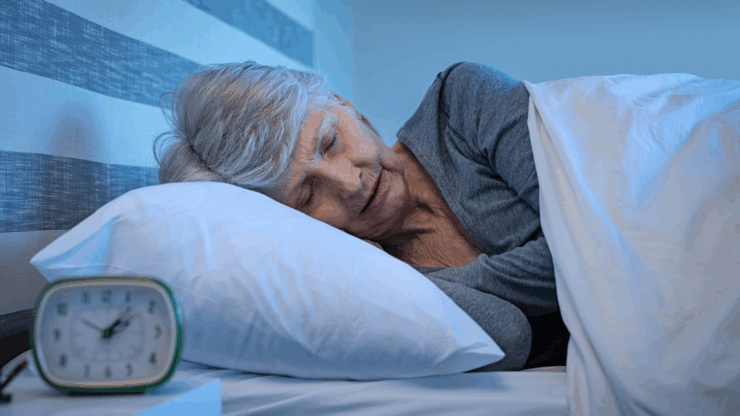
Alzheimer’s Awareness Month: How does Alzheimer’s affect sleep?

Presented in Partnership with the Alzheimer’s Drug Discovery Foundation
It’s National Alzheimer’s Awareness Month and it’s the best time to bring awareness to the disease and help people understand what it is. While the exact underlying causes of dementia are unknown, research shows family history, age, head trauma, lifestyle, and poor cardiovascular health are all risk factors.More recently, there are studies that have emerged demonstrating an existing connection between sleep and dementia. As with changes in memory and behavior, sleep changes may be related to the impact of Alzheimer’s on the brain.
In the below article, LifeWorx asked Yuko Hara, PhD, Director of Aging and Alzheimer’s Prevention at the Alzheimer’s Drug Discovery Foundation (ADDF) about the relationship between sleep and dementia, what factors might contribute to sleep disorders in Alzheimer’s patients, and recommended treatments.
LifeWorx: Sleep and dementia are complicated topics. Different types of dementia are associated with different sleep problems. It is important to understand what contributes to sleep problems in people with Alzheimer’s or dementia – and what you can do to help. What can you tell us about the relationship between sleep and dementia?
Dr. Hara: During sleep is when toxic proteins in the brain get flushed out, including beta-amyloid and tau, which are biological markers of Alzheimer’s disease. It’s also during sleep that important memories are consolidated. Getting seven to eight hours of sleep is optimal for brain health. Getting less than seven hours per night long-term could be harmful for brain health, as well as increasing risk for Alzheimer’s disease. Also, it is not just about the amount of sleep you get, but the quality that matters too. In a study of cognitively normal older people, those who had worse sleep quality, sleep problems, and daytime sleepiness showed higher levels of biological markers associated with Alzheimer’s disease.
To help reduce the risk of dementia and other health issues, it’s important to understand what could be causing sleep problems and learn how to improve your sleep routine. Below are additional resources written by the ADDF about the relationship between sleep and dementia:
- Sleep and Alzheimer’s disease: More evidence on their relationship
- Lack of sleep may be associated with an increased risk of dementia
- Sleep apnea and the risk of Alzheimer’s disease
LifeWorx: What factors might contribute to sleep disturbances and sundowning?
Dr. Hara: There are many factors that can contribute. Recommendations to help avoid these disturbances include avoiding alcohol several hours before bedtime because it can take 2-3 hours for your body to eliminate alcohol. Alcohol can cause you to feel awake when it’s time to go to bed or it may cause you to wake up during the night. Another tip is to stop smoking, or if you are in the process of quitting, avoid nicotine substances 4-6 hours before bed. Nicotine at high doses can have risk of sleep side effects. Also, beginning after lunch, avoid caffeine. And keep smartphones, TVs, and electronics outside of the bedroom. Blue light that’s emitted from these devices can decrease your levels of melatonin, a hormone that regulates the sleep-wake cycle. Long naps (longer than 30 minutes) and naps taken late in the day (after 4pm) can also negatively impact evening sleep quality.
LifeWorx: What treatments would you recommend for someone who is experiencing poor quality sleep?
Dr. Hara: There is no one-size-fits-all treatment for someone who is experiencing poor quality sleep. For some people, establishing a bedtime routine and maintaining a regular sleep schedule may significantly improve sleep quality. But if you suspect you have insomnia, sleep apnea, or other sleep disorders, you should talk to your healthcare provider about treatment options. Not all medications improve the quality of sleep, and some treatments carry brain health risks. Melatonin supplements are sometimes used to treat insomnia and it may modestly improve sleep, but experts do not recommend melatonin for elderly people with dementia, due to risks of falls and other adverse events.
Find your peace-of-mind.
Explore LifeWorx’ in-home elder care services.

















